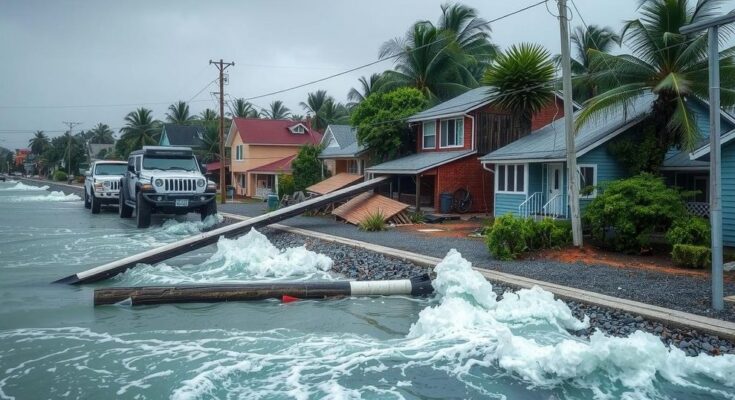Mayotte has been struck by Cyclone Chido, raising fears of thousands of casualties. Officials report significant destruction, with entire neighborhoods flattened and extensive damage to infrastructure. Rescue operations face challenges due to conditions on the ground, while aid efforts are being mobilized by the French government. The cyclone has since moved on to threaten Mozambique, potentially impacting millions.
A devastating cyclone struck the French territory of Mayotte on Saturday, leaving officials expressing grave concerns for the safety of the residents. While the official death toll was initially reported as low, French authorities anticipate that casualties may reach into the thousands. Prefect Francois-Xavier Bieuville highlighted the cyclone’s intensity, stating it was the most severe the island had experienced since 1934, with winds reaching up to 140 miles per hour.
Reports indicated extensive destruction across the islands, with neighborhoods flattened, numerous uprooted trees, and boats capsized or destroyed. As rescue operations commenced, conditions hindered immediate assessments of the situation, complicating the process of accounting for the missing or deceased. The French Interior Ministry mobilized resources, deploying 1,600 personnel to assist in the relief efforts and curb potential looting.
The socio-economic challenges of Mayotte, labeled as France’s “poorest island,” amplify the severity of the situation, as many residents reside in vulnerable conditions. In the wake of Cyclone Chido, aid efforts have been initiated by French President Emmanuel Macron, with immediate support dispatched to assist the impacted population. Local shelters, including schools and gyms, have been opened to accommodate approximately 100,000 individuals in need.
The cyclone’s destructive path continued east, impacting Mozambique, where approximately 2.5 million individuals may be at risk. Although concrete information regarding casualties in Mozambique remains unclear, UNICEF has commenced efforts to restore essential services disrupted by the storm.
Cyclone Chido, which affected Mayotte, illustrates the vulnerability of island communities in the face of extreme weather events. Mayotte, situated between Mozambique and Madagascar in the Indian Ocean, is marked by economic challenges, making natural disasters particularly devastating. This cyclone has not only raised concerns for immediate human loss but has implications for long-term recovery and infrastructure rebuilding. Furthermore, similar weather patterns are observed in regions like Hurricane Alley, where tropical storms frequently occur, emphasizing the global significance of climate preparedness and disaster response.
In conclusion, the aftermath of Cyclone Chido in Mayotte highlights urgent humanitarian needs and challenges in managing disaster responses in economically disadvantaged areas. With authorities counting potential casualties in the thousands and recognizing the extensive damage wrought upon the islands, the call for swift and effective aid is paramount. Additionally, the cyclone’s path to Mozambique underscores regional vulnerabilities and necessitates proactive measures to safeguard affected populations.
Original Source: www.thetravel.com




